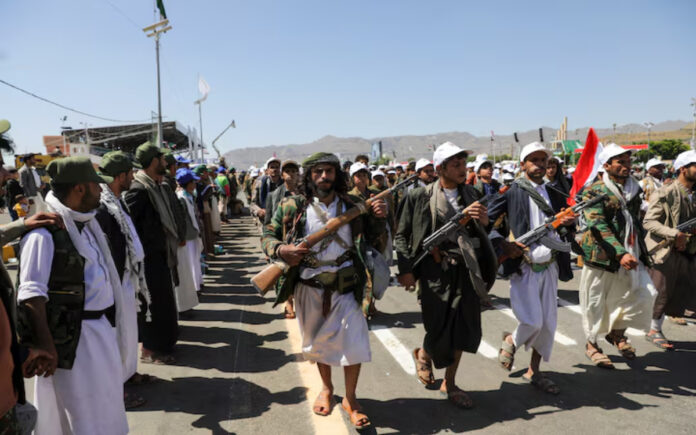United Nations: Yemen’s Houthi rebels have evolved “from a localized armed group with limited capabilities to a powerful military organization,” with key assistance from Iran’s elite Revolutionary Guard Corps (IRGC), Lebanon’s Hezbollah, and Iraqi specialists, according to a confidential U.N. report by sanctions monitors.
The independent panel of U.N. experts, which reports annually to the Security Council, stated that Houthi fighters have been receiving technical and tactical training outside Yemen. These fighters reportedly used fake passports to travel to Iran, Lebanon, and Iraq for training.
Over the past year, the Houthis have escalated drone and missile attacks on vessels in the Red Sea, a critical shipping route, in a show of support for Palestinians amid the Gaza war with Israel. These actions have disrupted global maritime trade by forcing shipping companies to reroute their cargo.
“Multiple testimonies from military experts, Yemeni officials, and even individuals close to the Houthis indicate they lack the capacity to independently develop and produce complex weapon systems without foreign support,” the U.N. experts wrote in the latest report, seen by Reuters.
The report further noted that the scale of foreign assistance to the Houthis, including military technology, financial support, and combat training, is “unprecedented.”
The Houthis have yet to respond to requests for comment on the U.N. report. Meanwhile, the sanctions monitors highlighted that the Houthis’ weapons systems are similar to those produced by Iran or by other members of the Tehran-backed “Axis of Resistance,” a coalition opposing Israel and U.S. influence in the Middle East.
“This transformation is due to the transfer of materiel and the training provided by IRGC-QF, Hezbollah, and Iraqi specialists,” the experts wrote. The “IRGC-QF” refers to the Quds Force, a branch of the Revolutionary Guards that operates overseas.
The “Axis of Resistance,” supported by Iran for decades, includes the Houthis, Palestinian militant group Hamas, Hezbollah, and various armed groups across Iraq and Syria.
The Houthis have been under a U.N. arms embargo since 2015, though Iran has consistently denied supplying weapons to the group. Iran’s U.N. mission has not yet responded to the report.
On Wednesday, Iran’s Foreign Minister Abbas Araqchi affirmed Iran’s support for Hezbollah, warning that Iran “would not remain indifferent” if the Lebanon-Israel conflict escalated.
Also Read | Hurricane John Re-strengthens, Soaks Mexico’s Pacific Coast
The U.N. report also expressed concern over growing collaboration between the Houthis and al Qaeda in the Arabian Peninsula, stating that both groups had agreed to cease internal conflict, transfer weapons, and coordinate attacks against Yemeni government forces.
Additionally, the experts noted increased smuggling of small and light weapons (SALWs) between the Houthis and Somalia-based militant group Al-Shabaab, suggesting shared military supplies or a common supplier.
The report also uncovered the Houthis’ use of counterfeit passports, which are issued to individuals acting on their behalf for military training or the procurement of illicit goods and weapons.
The detailed 38-page U.N. report includes hundreds of pages of annexes documenting these activities.



